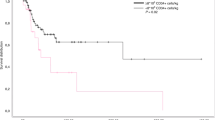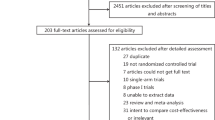Abstract
A phase II trial was performed to investigate the efficacy and tolerance of vinorelbine (VNB), 5-fluorouracil (5-FU), l-leucovorin (LLV) and recombinant human granulocyte colony-stimulating factor (G-CSF) in advanced breast cancer. Between August 1994 and October 1996, 53 patients entered this trial. Thirty-seven patients were previously untreated and 16 patients had failed previous palliative chemotherapy with (n = 12) or without anthracyclines (n = 4). Therapy consisted of VNB 40 mg m(-2) diluted in 250 ml of saline infused over 30 min on days 1 and 14 and LLV 100 mg m(-2) administered by intravenous bolus injection and 5-FU 400 mg m(-2) diluted in 500 ml of saline infused over 2 h, both given on days 1-5 every 4 weeks. G-CSF was administered at 5 microg kg(-1) day(-1) subcutaneously on days 6-10 during each cycle. Treatment was continued in cases of response or stable disease until a total of six courses were completed. The overall response rate was 59% for chemotherapeutically naive patients (95% confidence interval 42-75%), including five complete responses (CR; 13%) and 17 partial responses (PR; 46%); ten patients (27%) had stable disease (SD) and only five (14%) progressed (PD). Second-line chemotherapy with this regimen resulted in 3/16 (19%) objective remissions, but nine patients had SD and four had PD. The median time to progression was 10.5 months (range 2-23) in previously untreated patients and 7.0 months (range 2-19) in those who had failed prior chemotherapy. After a median follow-up time of 14 months, 29 patients (55%) are still alive with metastatic disease; median survival has not been reached yet. The dose-limiting toxicity was myelosuppression: WHO grade III and IV neutropenia occurred in 15 (28%) and four patients (8%), and was complicated by septicaemia in two; grade III anaemia and thrombocytopenia were noted in four (8%) and three (6%) patients respectively. Severe (WHO grade 3) non-haematological toxicities included stomatitis in 6% and nausea/vomiting and alopecia in 2% each. Our data suggest that the combination of vinorelbine, 5-fluorouracil and l-leucovorin plus G-CSF is an effective first line regimen for treatment of advanced breast cancer. Overall toxicity was modest, with myelosuppression being the dose-limiting side-effect. Other severe adverse reactions were uncommon.
This is a preview of subscription content, access via your institution
Access options
Subscribe to this journal
Receive 24 print issues and online access
$259.00 per year
only $10.79 per issue
Buy this article
- Purchase on Springer Link
- Instant access to full article PDF
Prices may be subject to local taxes which are calculated during checkout
Similar content being viewed by others
Author information
Authors and Affiliations
Rights and permissions
About this article
Cite this article
Kornek, G., Haider, K., Kwasny, W. et al. Effective treatment of advanced breast cancer with vinorelbine, 5-fluorouracil and l-leucovorin plus human granulocyte colony-stimulating factor. Br J Cancer 78, 673–678 (1998). https://doi.org/10.1038/bjc.1998.558
Issue Date:
DOI: https://doi.org/10.1038/bjc.1998.558
This article is cited by
-
Pharmacologic modulation of 5-fluorouracil by folinic acid and pyridoxine for treatment of patients with advanced breast carcinoma
Scientific Reports (2022)
-
Phase II study of weekly vinorelbine and 24-h infusion of high-dose 5-fluorouracil plus leucovorin as first-line treatment of advanced breast cancer
British Journal of Cancer (2005)



